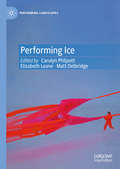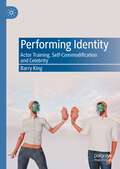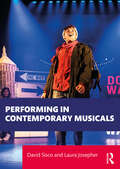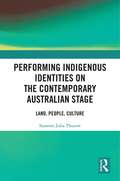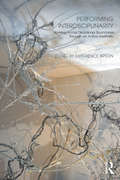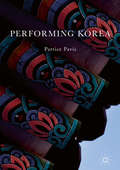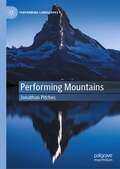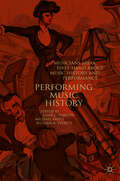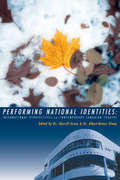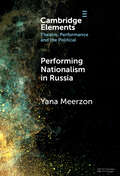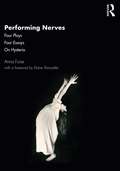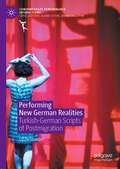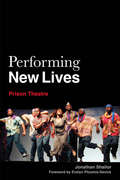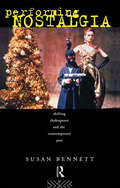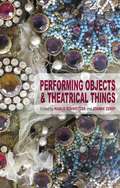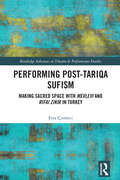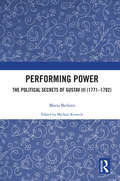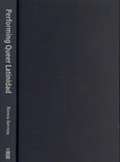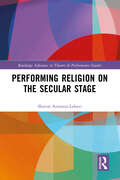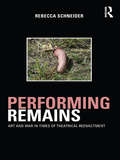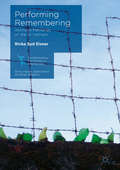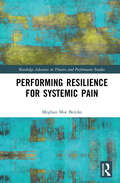- Table View
- List View
Performing Ice (Performing Landscapes)
by Elizabeth Leane Matt Delbridge Carolyn PhilpottIn the Anthropocene, icy environments have taken on a new centrality and emotional valency. This book examines the diverse ways in which ice and humans have performed with and alongside each other over the last few centuries, so as to better understand our entangled futures. Icescapes – glaciers, bergs, floes, ice shelves – are places of paradox. Solid and weighty, they are nonetheless always on the move, unstable, untrustworthy, liable to collapse, overturn, or melt. Icescapes have featured – indeed, starred – in conventional theatrical performances since at least the eighteenth century. More recently, the performing arts – site-specific or otherwise – have provoked a different set of considerations of human interactions with these non-human objects, particularly as concerns over anthropogenic warming have mounted. The performances analysed in the book range from the theatrical to the everyday, from the historical to the contemporary, from low-latitude events in interior spaces to embodied encounters with the frozen environment.
Performing Identity: Actor Training, Self-Commodification and Celebrity
by Barry KingThis book examines how the persistent and deepening casualization and precarity of acting work, coupled with market pressures, has affected the ways in which actors are trained in the US and UK. It reviews the existing state of training, looking at various theories of what the actor does, debates about casting, and the impact of reality television and social media. In the increasing effort to find ways to overcome the precarious labour market for actors and other performers, the traditional emphasis on theatrical character has been replaced by the celebration of the persona – a public image of the performer as a personal brand. As a result, a physiocratic elite, that literally incorporates the collective labour of cultural workers into the star or celebrity body, has formed. This book explores how the star or celebrity’s appearance and comportment are positioned as the rule of nature, formed and abiding outside capitalism as a mode of production. This book will be of interest to those studying theatre studies and performance, contemporary stardom and celebrity and the impact of technology on the formation of identity.
Performing in Contemporary Musicals
by David Sisco Laura JosepherPerforming in Contemporary Musicals brings into sharp focus the skills performers must possess when tackling shows that are newly written, in development, or somewhere in between. The authors bust myths about contemporary musical theatre and analyze the development timelines of musicals from around the world. They also explore how performers can become invaluable to a creative team by developing the skills needed to move a new musical forward including: contemporary acting and singing techniques, dramaturgy, quickly picking up new material, and collaboration. Each chapter features insightful industry interviews, recommended activities, an extensive reading list, and an online companion for further study. This textbook is the only comprehensive resource that provides an overview of the development process of a new musical while guiding musical theatre performers to be fruitful collaborators in a new works scenario.
Performing Indigenous Identities on the Contemporary Australian Stage: Land, People, Culture
by Susanne Julia ThurowOver the past 50 years, Indigenous Australian theatre practice has emerged as a dynamic site for the discursive reflection of culture and tradition as well as colonial legacies, leveraging the power of storytelling to create and advocate contemporary fluid conceptions of Indigeneity. Performing Indigenous Identities on the Contemporary Australian Stage offers a window into the history and diversity of this vigorous practice. It introduces the reader to cornerstones of Indigenous Australian cultural frameworks and on this backdrop discusses a wealth of plays in light of their responses to contemporary Australian identity politics. The in-depth readings of two landmark theatre productions, Scott Rankin’s Namatjira (2010) and Wesley Enoch & Anita Heiss’ I Am Eora (2012), trace the artists’ engagement with questions of community consolidation and national reconciliation, carefully considering the implications of their propositions for identity work arising from the translation of traditional ontologies into contemporary orientations. The analyses of the dramatic texts are incrementally enriched by a dense reflection of the production and reception contexts of the plays, providing an expanded framework for the critical consideration of contemporary postcolonial theatre practice that allows for a well-founded appreciation of the strengths yet also pointing to the limitations of current representative approaches on the Australian mainstage. This study will be of great interest to students and scholars of Postcolonial, Literary, Performance and Theatre Studies.
Performing Interdisciplinarity: Working Across Disciplinary Boundaries Through an Active Aesthetic
by Experience BryonPerforming Interdisciplinarity proposes new ways of engaging with performance as it crosses, collides with, integrates and/or disturbs other disciplinary concerns. From Activism and Political Philosophy to Cognitive Science and Forensics, each chapter explores the relationships between performance and another discipline. Including cross-chapter discussions which address the intersections between fields, Performing Interdisciplinarity truly examines the making of meaning across disciplinary conventions. This is a volume for performance practitioners and scholars who are living, learning, writing, teaching, making and thinking at the edges of their specialisms.
Performing Korea
by Patrice PavisThis book offers an exploration of the intersection of Korean theatre practice with Western literary theatre. Gangnam Style, K-Pop, the Korean Wave : who hasn't heard of these recent Korean phenomena? Having spent two years in Korea as a theatrical and cultural 'tourist', Patrice Pavis was granted an unparalleled look at contemporary Korean culture. As well as analyzing these pop culture mainstays, however, he also discovered many uniquely Korean jewels of contemporary art and performance. Examining topics including contemporary dance, puppets, installations, modernized pansori, 'Koreanized' productions of European Classics and K-pop and its parody, this book provides a framework for an intercultural and globalized approach to Korean theatre. With the first three chapters of the book outlining methodology, the remaining chapters test - often deconstructing and transforming in the process - this framework, using focused case studies to introduce the reader to the cultural and artistic world of a nation with an increasing international presence in theatre and the arts alike.
Performing Migrancy and Mobility in Africa
by Mark FleishmanPerforming Migrancy and Mobility in Africa focuses on a body of performance work, the work of Magnet Theatre in particular but also work by other artists in Cape Town and other parts of the continent or the world, that engages with the Cape as a real or imagined node in a complex system of migration and mobility. Located at the foot of the African continent, lodged between two oceans at the intersection of many of the earth's major shipping lanes, Cape Town is a stage for a powerful mixing of cultures and peoples and has been an important node in a network of flows, circuits of movement and exchange. The performance works studied here attempt to get to grips with what it feels like to be on the move and in the spaces in-between that characterises the lives, now and for centuries before, of multiple peoples who move around and pass through places like the Cape. The contributors are a broad range of mostly African authors from various parts of the continent and as such the book offers an insight into new thinking and new approaches from an emerging and important location.
Performing Mountains (Performing Landscapes)
by Jonathan PitchesLaunching the landmark Performing Landscapes series, Performing Mountains brings together for the first time Mountain Studies and Performance Studies in order to examine an international selection of dramatic responses to mountain landscapes. Moving between different registers of writing, the book offers a critical assessment of how the cultural turn in landscape studies interacts with the practices of environmental theatre and performance. Conceived in three main parts, it begins by unpicking the layers of disciplinary complexity in both fields, before surveying the rich history and practice of rituals, playtexts and site specific works inspired by mountains. The last section moves to a unique analysis of mountains themselves using key concepts from performance: training, scenography, acting and spectatorship. Threaded throughout is a very personal tale of mountain research, offering a handrail or alternative guide through the book.
Performing Music History: Musicians Speak First-Hand about Music History and Performance
by John C. Tibbetts Michael Saffle William A. EverettPerforming Music History offers a unique perspective on music history and performance through a series of conversations with women and men intimately associated with music performance, history, and practice: the musicians themselves. Fifty-five celebrated artists—singers, pianists, violinists, cellists, flutists, horn players, oboists, composers, conductors, and jazz greats—provide interviews that encompass most of Western music history, from the Middle Ages to contemporary classical music, avant-garde innovations, and Broadway musicals. The book covers music history through lenses that include “authentic” performance, original instrumentation, and social context. Moreover, the musicians interviewed all bring to bear upon their respective subjects three outstanding qualities: 1) their high esteem in the music world as immediately recognizable names among musicians and public alike; 2) their energy and devotion to scholarship and the recovery of endangered musical heritages; and 3) their considerable skills, media savvy, and showmanship as communicators. Introductory essays to each chapter provide brief synopses of historical eras and topics. Combining careful scholarship and lively conversation, Performing Music History explores historical contexts for a host of fascinating issues.
Performing National Identities
by Albert-Reiner Glaap Sherrill GraceA collection of eighteen original essays on contemporary Canadian theatre by scholars and drama specialists in Canada, Great Britain, Europe, Australia, Hungary, and Japan. The international scope of the volume, reflected in its co-editors (Sherrill Grace from Canada, Albert-Reiner Glaap from Germany), confirms the new importance of Canadian plays on the world stage.
Performing Nationalism in Russia (Elements in Theatre, Performance and the Political)
by null Yana MeerzonFollowing Homi Bhabha's prompt on reading nationalism as a set of discursive and performative practices, this Element focuses on the cultural geography of today's Russia and examines a range of performative strategies used by the Russian state to uphold its nationalist project. Simultaneously, it maps artistic strategies of resistance to the ideology of nationalism as employed by both state-funded and independent theatre companies, via new dramaturgies, performance practices and strategies of storytelling.
Performing Nerves: Four Plays, Four Essays, On Hysteria
by Anna FurseAcademic interest in hysteria has burgeoned in recent decades. The topic has been probed by feminist theorists, cultural studies specialists, literary scholars, anthropologists, sociologists, psychologists, medical and art historians, as well as novelists. The hysteric is construed as a powerless, voiceless subject, marginalised by the forces of the patriarchy that have been the root cause of their distress, dissembling, and disablement. In Performing Nerves, Anna Furse interweaves her artistic and academic practice, drawing on her own performance texts to explore four different versions of debilitating hysteric suffering. Each text is extensively annotated, revealing the dramaturgical logic and, in turn, the historical, medical, and cultural contexts behind their protagonists' illnesses, which are argued as environmentally caused in each case. This unique, reflective insight into a playwright and director’s craft offers not only an account of how mental suffering can manifest in different contexts and times, from the 19th century to today, but also a breadth of access to the ideas that can motivate creative research. This book is an invaluable resource for scholars of theatre studies, performance studies, dramaturgy, 20th-century history, gender studies, and medical humanities.
Performing New German Realities: Turkish-German Scripts of Postmigration (Contemporary Performance InterActions)
by Lizzie Stewart'One in four people in Germany today have a so-called migration background, however, the relationship between theatre and migration there has only recently begun to take centre stage. Indeed, fifty years after large-scale Turkish labour migration to the Federal Republic of Germany began, theatre by Turkish-German artists is only now becoming a consistent feature of Germany’s influential state-funded theatrical landscape. Drawing on extensive archival and field work, this book asks where, when, why, and how plays engaging with the new realities of “postmigrant” Germany have been performed over the past 30 years. Focusing on plays by renowned artists Emine Sevgi Özdamar, and Feridun Zaimoglu/Günter Senkel, it asks which new realities have been scripted in the theatrical sphere in the process – in the imaginations of playwrights, readers, audience members; in the enactment and direction of scripts on stage; and in the performance of new institutional approaches and cultural policies. Highlighting the role this theatre has played in a larger, ongoing re-scripting of the German stage, this study presents a critical perspective on contemporary European theatre and opens innovative developments in the conceptualization of theatre and post/migration from the German context to English language readers.
Performing New Lives
by Jonathan ShailorPerforming New Lives draws together some of the most original and innovative programs in contemporary prison theatre. Leading prison theatre directors and practitioners discuss the prison theatre experience first-hand, and offer valuable insights into its role, function, and implementation. A wide range of prison theatre initiatives are discussed, from long-running, high-profile programs such as Curt Tofteland's "Shakespeare Behind Bars" in LaGrange, Kentucky, to fledgling efforts like Jodi Jinks' "ArtsAloud" project in Austin, Texas. The book offers unique insights into the many dimensions of the prison theatre experience, including: negotiating the rules and restrictions of the prison environment; establishing trust, teaching performance skills and managing crises; building relationships and dealing with conflicts; and negotiating public performances and public perceptions. Excerpts of interviews with inmates, and a conversation between practitioners in the final chapter, reveal the impact that prison theatre programs have on the performers themselves, as well as audience members, and the wider community. Exploring prison theatre processes and theory with insights into how it works in practice, and how to replicate it, this book is essential reading for drama therapists, theatre artists, and prison educators, as well as academics.
Performing Nostalgia: Shifting Shakespeare and the Contemporary Past
by Susan BennettIn this trenchant work, Susan Bennett examines the authority of the past in modern cultural experience and the parameters for the reproduction of the plays. She addresses these issues from both the viewpoints of literary theory and theatre studies, shifting Shakespeare out of straightforward performance studies in order to address questions about his plays and to consider them in the context of current theoretical debates on historiography, post-colonialism and canonicity.
Performing Oaths in Classical Greek Drama
by Judith FletcherOaths were ubiquitous rituals in ancient Athenian legal, commercial, civic and international spheres. Their importance is reflected by the fact that much of surviving Greek drama features a formal oath sworn before the audience. This is the first comprehensive study of that phenomenon. The book explores how the oath can mark or structure a dramatic plot, at times compelling characters like Euripides' Hippolytus to act contrary to their best interests. It demonstrates how dramatic oaths resonate with oath rituals familiar to the Athenian audiences. Aristophanes' Lysistrata and her accomplices, for example, swear an oath that blends protocols of international treaties with priestesses' vows of sexual abstinence. By employing the principles of speech act theory, this book examines how the performative power of the dramatic oath can mirror the status quo, but also disturb categories of gender, social status and civic identity in ways that redistribute and confound social authority.
Performing Objects and Theatrical Things
by Marlis Schweitzer Joanne ZerdyThis book rethinks historical and contemporary theatre, performance, and cultural events by scrutinizing and theorizing the objects and things that activate stages, venues, environments, and archives.
Performing Orthodox Ritual in Byzantium
by Andrew Walker WhiteIn this groundbreaking, interdisciplinary study, Andrew Walker White explores the origins of Byzantine ritual - the rites of the early Greek Orthodox Church - and its unique relationship with traditional theatre. Tracing the secularization of pagan theatre, the rise of rhetoric as an alternative to acting, as well as the transmission of ancient methods of musical composition into the Byzantine era, White demonstrates how Christian ritual was in effect a post-theatrical performing art, created by intellectuals who were fully aware of traditional theatre but who endeavoured to avoid it. The book explores how Orthodox rites avoid the aesthetic appreciation associated with secular art, and conducts an in-depth study (and reconstruction) of the late Byzantine Service of the Furnace. Often treated as a liturgical drama, White translates and delineates the features of five extant versions, to show how and why it generated widely diverse audience reactions in both medieval times and our own.
Performing Post-Tariqa Sufism: Making Sacred Space with Mevlevi and Rifai Zikir in Turkey (Routledge Advances in Theatre & Performance Studies)
by Esra ÇizmeciThis ethnographic research project examines the generation of post-tariqa Tasavvuf (Sufism: a spiritual practice and philosophy recognised as the inner dimension of Islam) in a variety of private, semi-public, public, secular and sacred urban spaces in present-day Turkey. Through extensive field research in minority Sufi communities, this book investigates how devotees of specific orders maintain, adapt, mobilise, and empower their beliefs and values through embodied acts of their Sufi followers. Using an ethnographic methodology and theories derived from performance studies, Esra Çizmeci examines the multiple ways in which the post-tariqa Mevlevi and Rifai practice is formed in present-day Turkey, such as through the authority of the spiritual teacher; the individual and collective performance of Sufi rituals; nefs (self) training; and, most importantly, the practice of Sufi doctrines in everyday life through the production of sacred spaces. Drawing on the theories of performance, she examines how the Sufi way of living and spaces are created anew in the process of each devotee’s embodied action. This book is informed by theories in performance studies, anthropology, religious studies, and cultural studies and places current Sufi practices in a historical perspective.
Performing Power: The Political Secrets of Gustav III (1771-1792)
by Maria BerlovaPerforming Power explores 18th-century fabrication of the royal image by focusing on the example of King Gustav III (1746–1792) – one of Sweden’s most acclaimed and controversial monarchs – who conspicuously chose theater as the primary media for his image-making and role construction. The text postulates that Gustav III was motivated by theater’s ability to aid him in fulfilling Enlightenment’s tenet of broadly educating the populace and inculcating it with royal ideology. That he was an amateur actor, stage director, and playwright were other engines driving his choice. The project challenges and expands the commonly accepted perception of Gustav III’s contribution to Swedish theater, which has generally been limited to founding its National Opera, developing its national drama, and forming its national dramatic repertoire. Maria Berlova presents Gustav III as a performing King who strategically used political events as a framework through which he could embody the image of the ideal or enlightened monarch as presented by Voltaire. Through this, Performing Power explores the tight relationship and complex bond between theatrical arts and politics. This unique study will be of great interest to students and scholars in theater studies, 18th-century culture, and politics.
Performing Queer Latinidad: Dance, Sexuality, Politics
by Rivera-Servera Ramón H.Performing Queer Latinidad highlights the critical role that performance played in the development of Latina/o queer public culture in the United States during the 1990s and early 2000s, a period when the size and influence of the Latina/o population was increasing alongside a growing scrutiny of the public spaces where latinidad could circulate. Performances---from concert dance and street protest to the choreographic strategies deployed by dancers at nightclubs---served as critical meeting points and practices through which LGBT and other nonnormative sex practitioners of Latin American descent (individuals with greatly differing cultures, histories of migration or annexation to the United States, and contemporary living conditions) encountered each other and forged social, cultural, and political bonds. At a time when latinidad ascended to the national public sphere in mainstream commercial and political venues and Latina/o public space was increasingly threatened by the redevelopment of urban centers and a revived anti-immigrant campaign, queer Latinas/os in places such as the Bronx, San Antonio, Austin, Phoenix, and Rochester, NY, returned to performance to claim spaces and ways of being that allowed their queerness and latinidad to coexist. These social events of performance and their attendant aesthetic communication strategies served as critical sites and tactics for creating and sustaining queer latinidad.
Performing Religion on the Secular Stage (Routledge Advances in Theatre & Performance Studies)
by Sharon Aronson-LehaviThis book examines the relations between Western religion, secularism, and modern theater and performance. Sharon Aronson-Lehavi posits that the ongoing cultural power of religious texts, icons, and ideas on the one hand and the artistic freedom enabled by secularism and avant-garde experimentalism on the other, has led theatre artists throughout the twentieth century to create a uniquely modern theatrical hybrid–theater performances that simultaneously re-inscribe and grapple with religion and religious performativity. The book compares this phenomenon with medieval forms of religious theater and offers deep and original analyses of significant contemporary works ranging from plays and performances by August Strindberg, Hugo Ball (Dada), Jerzy Grotowski, and Hanoch Levin, to those created by Adrienne Kennedy, Rina Yerushalmi, Deb Margolin, Milo Rau, and Sarah Ruhl. The book analyzes a new and original historiography of a uniquely modern theatrical phenomenon, a study that is of high importance considering the reemergence of religion in contemporary culture and politics.
Performing Remains: Art and War in Times of Theatrical Reenactment
by Rebecca Schneider'At last, the past has arrived! Performing Remains is Rebecca Schneider's authoritative statement on a major topic of interest to the field of theatre and performance studies. It extends and consolidates her pioneering contributions to the field through its interdisciplinary method, vivid writing, and stimulating polemic. Performing Remains has been eagerly awaited, and will be appreciated now and in the future for its rigorous investigations into the aesthetic and political potential of reenactments.' - Tavia Nyong'o, Tisch School of the Arts, New York University 'I have often wondered where the big, important, paradigm-changing book about re-enactment is: Schneider’s book seems to me to be that book. Her work is challenging, thoughtful and innovative and will set the agenda for study in a number of areas for the next decade.' - Jerome de Groot, University of Manchester Performing Remains is a dazzling new study exploring the role of the fake, the false and the faux in contemporary performance. Rebecca Schneider argues passionately that performance can be engaged as what remains, rather than what disappears. Across seven essays, Schneider presents a forensic and unique examination of both contemporary and historical performance, drawing on a variety of elucidating sources including the "America" plays of Linda Mussmann and Suzan-Lori Parks, performances of Marina Abramovic´ and Allison Smith, and the continued popular appeal of Civil War reenactments. Performing Remains questions the importance of representation throughout history and today, while boldly reassessing the ritual value of failure to recapture the past and recreate the "original."
Performing Remembering: Women's Memories of War in Vietnam (Contemporary Performance InterActions)
by Rivka Syd EisnerThis book explores the performances and politics of memory among a group of women war veterans in Ho Chi Minh City, Vietnam. Through ethnographic, oral history-based research, it connects the veterans’ wartime histories, memory politics, performance practices, recollections of imprisonment and torture, and social activism with broader questions of how to understand and attend to continuing transgenerational violence and trauma. With an extensive introduction and subsequent chapters devoted to in-depth analysis of four women’s remarkable life stories, the book explores the performance and performativity of culture; ethnographic oral history practice; personal, collective, and (trans)cultural memory; and the politics of postwar trauma, witnessing, and redress. Through the veterans’ dynamic practices of prospective remembering, 'pain-taking', and enduring optimism, it offers new insights into matrices of performance vital to the shared work of social transformation. It will appeal to readers interested in performance studies, memory studies, gender studies, Vietnamese studies, and oral history.
Performing Resilience for Systemic Pain (Routledge Advances in Theatre & Performance Studies)
by Meghan Moe BeitiksHow might performance serve as a means for facing ubiquitous trauma and pain, in humans and ecologies? While reflecting on her multidisciplinary work Systems of Pain/Networks of Resilience, artist Meghan Moe Beitiks considers bodies of knowledge in Trauma Theory, Intersectional Feminist Philosophy, Ecology, Disability Studies, New Materialism, Object-Oriented Ontology, Gender Studies, Artistic Research, Psychology, Performance Studies, Social Justice, Performance Philosophy, Performance Art, and a series of first-person interviews in an attempt to answer that question. Beitiks brings us through the first-person process of making the work and the real-life, embodied encounters with the theories explored within it as an expansion of the work itself. Facing down difficult issues like trauma, discrimination, and the vulnerability of the body, Beitiks looks to commonalities across species and disciplines as means of developing resilience and cultivating communities. Rather than paint a picture of glorious potential utopias, Beitiks takes a hard look at herself as an embodiment of the values explored in the work, and stays with the difficult, sucky, troubling, work to be done. Performing Resilience for Systemic Pain is a vulnerable book about the quiet presence and hard looking needed to shift systems away from their oppressive, destructive realities.
